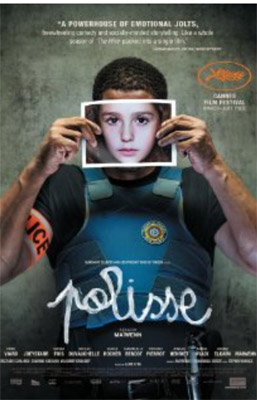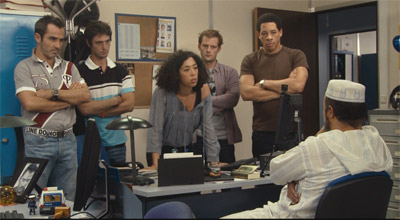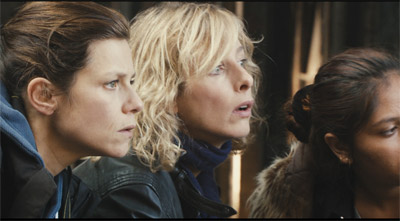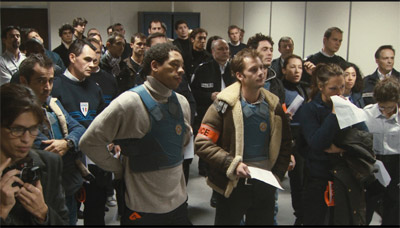Maiweenn Polisse Interview

Maiweenn Polisse Interview
Cast: Karin Viard, Joey Starr, Marina FoïsDirector: Maiweenn
Genre: Crime, Drama
Running Time: 127 minutes
Synopsis: The daily grind for the police officers of the Child Protection Unit - taking in child molesters, busting underage pickpockets and chewing over relationship issues at lunch; interrogating abusive parents, taking statements from children, confronting the excesses of teen sexuality, enjoying solidarity with colleagues and laughing uncontrollably at the most unthinkable moments.
Knowing the worst exists and living with it. How do these police officers balance their private lives and the reality they confront every working day?
Fred, the group's hypersensitive wild card, is going to have a hard time facing the scrutiny of Melissa, a photographer on a Ministry of the Interior assignment to document the unit.
Release Date: June 28th, 2012
Interview with Maiweenn
Question: How did you come up with the idea of making a film about the Child Protection Unit?Maiweenn: I happened to see a TV documentary on the Child Protection Unit and was deeply moved. The next day I immediately called the TV channel and said I wished to contact the documentary director - I wanted to know how to meet up with the Child Protection Unit (CPU) police officers.
Question: That was the next step, wasn't it?
Maiweenn: Before I could be sure I really wanted to write a script on the CPU, I felt I needed to get to know the lives of these police officers. I wanted to spend time with them, to listen to them and watch them live. It was a long, hard slog. But once I was eventually allowed my sort of "internship" I kept going from one group to the other. I was taking notes, I was like a sponge absorbing all the info I could get. Even during the three-hour lunch break or after hours when they had a drink I would tag along so as not to miss any of their discussions and I'd ask thousands of questions.
Question: How much did the time you spent with them inspire the screenplay?
Maiweenn: What I wrote was based only on stories I had actually witnessed or on stories the officers told me. I changed a few things about some of the cases but I didn't invent any of them. I got to know precisely what these police officers did on a daily basis, and I didn't want to skip any of their everyday duties: I wanted to mention paedophiles, incest in an upper-class family, the teenage environment etc... On the other hand I found it important to show that when police officers deal with a case they follow it as long as the defendant is in custody but they are not necessarily informed of the verdict. They need to deal with one case after another very quickly in order not to be emotionally involved in any of them. So I was determined not to let the viewer know what becomes of the defendants, because police officers don't know what happens to them either.
 Question: What was it like writing the script with Emmanuelle Bercot?
Question: What was it like writing the script with Emmanuelle Bercot? Maiweenn: To begin with, I wrote the first draft on my own and then Emmanuelle Bercot joined me. In the beginning she intended to work with me for only a short time. We are very good friends and she was afraid that working together might affect our relationship, but I didn't agree with her. I was pretty sure our collaboration would strengthen our friendship and our work would benefit from it.
So she told me: "I'll work with you for about ten days, but no more. It will give us time to define the characters clearly and then you are in charge of the dialogue, I won't interfere." Ten days later, she was still with me, we had an office in the production offices and we would work almost every day, from 9am on. As the days and the weeks went by, we started talking about the structure of the narrative, we re-worked it together, then we tackled the dialogue. It came quite naturally. She kept on refusing to write, but she would come up with dialogue lines and I was the one typing. Then one day, she said: "OK, I feel this scene is fine, I'll write the dialogue." And she sat at the computer. I was extremely touched to see that, after a few months she had adopted the script, it had become 'our' script.
I must say that in the first draft, even if you find it hard to believe, the police officers turn into rogue cops, do a hold-up and then head to Las Vegas to spend the money! It was Alain Attal who made me change my mind. Anyway, the budget wouldn't have allowed me to shoot in Las Vegas.
So I'd say that collaborating with Emmanuelle Bercot was extremely enriching. I think that we are complementary. She brought a lot of 'realism' to our work and her pet phrase was "It sounds real." I, on the other hand, kept trying to add a touch of humour because that was what struck me when I arrived at the CPU: I realised that humour was their only weapon against human misery.
Question: There's a strong sense of camaraderie between police officers...
Maiweenn: What interested me was that the unit almost looks like a family unit: the officers are together from morning till evening, they even have breakfast and after hours' drinks together! Sometimes, however, their relationships do grow tense because there's a lot of rivalries and love affairs going on... You have to bear in mind that many CPU officers are women and they have something to prove, unlike their male counterparts.
Question: You've also addressed the various forms of cowardice on the part of high- ranking officers when dealing with an influential defendant.
Maiweenn: Yes indeed. This story happened less than ten years ago and it was the officers themselves who told me about it. It was the case of a man in a high position of power. He had been raping his daughter for several years and yet he got away with his crime thanks to his status and his connections. Even if the chief superintendent insisted that this sort of injustice was a thing of the past and wouldn't happen nowadays, it wouldn't be true to say that all defendants are treated equally.
Question: It's a very character-driven film. How did you come up with the characters?
Maiweenn: Unlike the cases which are real, the characters are mostly fictional. EmmanuelleBercot and I wrote a sort of 'bible' for each protagonist with biographical elements and personality features as well as details on the relationships and rivalries between the unit members. Even though you don't find all of this information in the film, it helped some of the actors who consulted the 'bible' during the shoot.
Question: You've also addressed the fact that the CPU and other police departments have a hard time getting along.
Maiweenn: Yes. CPU officers are often looked down on by the other police departments! Besides, they are nicknamed the "Baby Unit." It is preposterous that the Drugs Squad has more resources - even if it performs a crucial role - than the department whose job it is to protect children and teenagers in Paris! A baby has been shaken violently? They are in charge of the case. A teenager has committed suicide? They are in charge. A child has run away? It's them again. Let me add one small detail: the Child Protection Unit only deals with under-age victims. If an under-age person commits a felony against an adult, he or she is sent to the department specialising in this type of felony. But sometimes kids think they are culprits whereas in fact they are just victims: this is the case with subway pickpockets. They are exploited minors, therefore victims and it's the CPU's task to catch those who exploit them. What makes their job particularly hard is that those who exploit them are... their families.
Consequently they spend their time catching either the parents or a brother, an uncle, a teacher... This is what makes their job so complex: they have to explain to the judges that the incest, the rape, or the abuse took place inside the family and that it was not committed violently. Violence can be silent... it's the worst sort of violence, I think. Inaudible violence.
 Question: You go from heartrending to funny scenes.
Question: You go from heartrending to funny scenes. Maiweenn: I think it's important to be able to make fun of horrible events because otherwise life is not bearable. And as I have already said, it's the only way for policemen to keep alive.
Question: In this environment, police officers seem to let their work affect their relationships with their kids. Is that inevitable?
Maiweenn: Exactly, this is what I have noticed. There is a sort of mirror effect between the professional lives of these cops and their private lives. For instance I remember a policeman telling me that since he had been working with the CPU he hadn't been able to tickle his own daughter. So every gesture is carefully chosen, measured and thought out - too carefully, in my opinion. That's what we see when Joeystarr gives his daughter a bath.
Question: Can you talk about the camerawork?
Maiweenn: In my opinion, the most important thing is that the camera must be as unobtrusive as possible. It must focus on the actors and not the other way around. I absolutely wanted the actors to forget about the camera. But I don't have any special way of reaching this goal. I adjust to each actor, each situation, and I have to handle every challenge for the camerawork to be as inconspicuous as possible.
Most of the time we used two digital cameras, sometimes three, because the sets were quite tiny. I asked my camera people, Pierre Aïm, Claire Mathon and Jowan Le Besco to 'feel' the emotions and live with the actors. They had to be both very unassuming and good listeners at the same time. Claire Mathon, with whom I have already made three movies, is like an animal: I hardly ever need to talk to her. As for Jowan, he constantly takes instant shots, I love it. Pierre Aïm was in charge of the lighting. The three of them were equally important. I know that on a classical set the cameraman is very close to the director, but that isn't my way of handling things. Those who hold the camera must be like animals and I wanted the four of us to be tightly linked. Moreover the lighting does come first for me. What really matters is to capture moments of truth, and to be able to do so you must be listening to everything around you and be ready to shoot it instantly, and that's what we did.
Question: Are there any movies that inspired you?
Maiweenn: Yes, first of all I think that I watched every cop film, be it French or foreign... Even Alain Delon, when he played the cop. But I really found my inspiration in Virgil Vernier's documentaries on the police. They show the point of view of a real film director on what life is really like. Generally speaking, a bad documentary is a better source of inspiration for me than a very good feature film. I'm not a film buff, I'm trying to become one, but I must say that my knowledge doesn't really help me to write. What I personally find overwhelming and makes me feel like writing is when I know that the story actually happened. What keeps me going is real-life events.
 Question: Why did you cast Joeystarr as a police officer?
Question: Why did you cast Joeystarr as a police officer?Maiweenn: Even before I knew I was going to shoot a film on the CPU I wanted him to havethe leading role in my new film and I intended to make a movie about a love story between two characters from completely opposite backgrounds. That was one of the basic ingredients but I wasn't sure how I could exploit it: when I came across the TV documentary on the CPU, I knew exactly which part I was going to give him. I wrote this film for him, he was my driving force and my source of inspiration. What's more, I wanted to surprise him and to make him proud of me. Plus I felt I had not made good use of his potential in The Actress' Ball, and I wanted to go even deeper and access his innermost frailty and modesty.
Question: What was the casting process like? Did you feel like working again with several cast members from The Actress' Ball?
Maiweenn: Working with certain actors doesn't necessarily mean casting them again. I'm not much of a family person when it comes to casting. All I focus on is the film and the characters. There are actors who were very close to me and whom I did not cast again and I hope they don't think that it's a matter of preference or affinity. I mainly chose actors who would be credible playing cops. In my opinion all of them had to have a common feature - they had to look like working class people and speak in vernacular Parisian French.
Question: How did the actors transform into their characters?
Maiweenn: They all did an workshop, not inside the CPU because the superintendent had told me that it wouldn't be possible. So I hired two cops who were former CPU officers and the cast learnt about the trade for a whole week, working eight hours a day. Every day they would watch documentaries on incest and all sorts of police stuff: drug trafficking, petty and organised crime, etc... My intention was to feed their unconscious minds. Little by little the mere fact of being immersed in this atmosphere made them copy the humour and the vernacular of cops. Making believe that a group has long been working together is no easy task. This was also the aim of the workshop.
Question: Were you with them while they trained for the film?
Maiweenn: Yes, because I had many more things to learn. And throughout the film making from pre-production to editing, I kept learning. I tried to get an in-depth grasp of how the CPU operated. Besides, I kept wondering - anxiously - if I was credible. I felt very comfortable dealing with the topic of my first two movies, but I felt I took risks with Poliss because I didn't have full mastery of my characters' occupation. This accounts for the presence of police officers during the entire shoot. They helped me straighten things out when the situation didn't seem credible to them.
Question: Editing...
Maiweenn: I was lucky to be working with fantastic editors, like Laure Gardette, who has been with me since I started out, Yann Dedet, who gave us a hand and Loïc Lallemand as assistant editor. We shot 150 hours of rushes... We then worked in three editing rooms for three months. I had to adjust to the three of them because each had his or her own working methods. It was hard even if it was enriching to work quickly. As soon as I had the first cut, I only worked with Laure because I needed to rely on one person for advice. The first cut lasted 3hr 20. When I saw Alain Attal's face during the screening, I immediately took a new turn with Laure. Alain is as voluble when he thinks it's good as when he thinks it's bad. Sometimes he told me: "It stinks, dump it right away!" Then he'd say: "It's brilliant! If you cut this scene, I'll kill you!"
His enthusiasm and lack thereof were very supportive. The same goes for Philippe Lefebvre who introduced me to Productions du Trésor and who helped me a lot even during the writing period.
Question: Why did you want to work with composer Stephen Warbeck?
Maiweenn: He wrote the score for Nicole Garcia's A View Of Love which I liked very much. I wanted to find the same Oriental, 'ethnic' and ethereal tonalities as in his score, but without too much emphasis on the emotions.
Question: Why did you call the film Poliss and not Police?
Maiweenn: To begin with, the title should have been Police but there was already a film with this title, and it was quite a film! Then I thought about You're From The Police? But I realised this title had also been used some years ago. And then, one day, as my son was doing writing exercises the title POLISS, with a spelling mistake and childish handwriting struck me as obvious for the film subject.
MORE
- Mission: Impossible Fallout
- Glenn Close The Wife
- Allison Chhorn Stanley's Mouth Interview
- Benicio Del Toro Sicario: Day of the Soldado
- Dame Judi Dench Tea With The Dames
- Sandra Bullock Ocean's 8
- Chris Pratt Jurassic World: Fallen Kingdom
- Claudia Sangiorgi Dalimore and Michelle Grace...
- Rachel McAdams Disobedience Interview
- Sebastián Lelio and Alessandro Nivola...
- Perri Cummings Trench Interview



